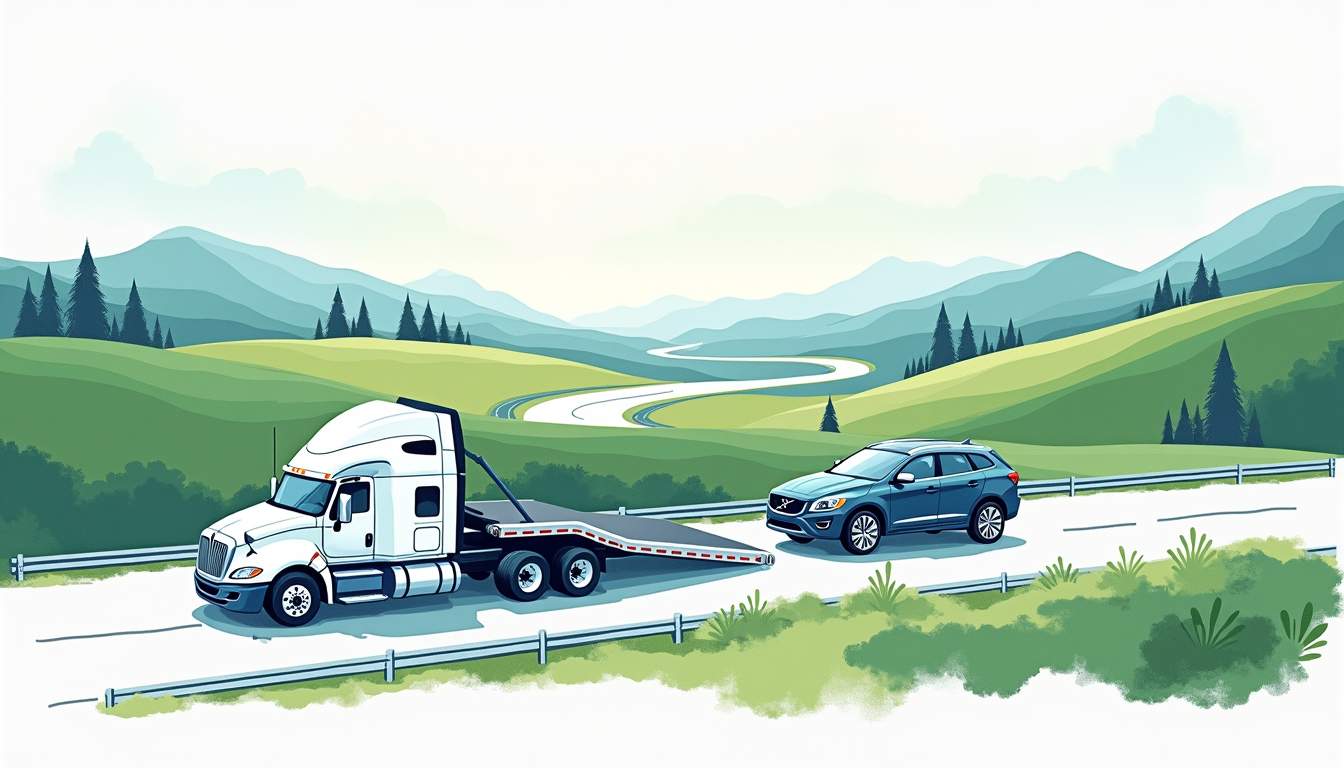Towing a car over long distances can be a daunting task, whether it’s for relocation, a vehicle purchase, or an emergency. Understanding the best practices and services available can make the process smoother and more efficient. This guide provides insights into long distance towing services, preparation steps, cost factors, and safety tips to ensure a successful towing experience.
Understanding Long Distance Towing Services
Defining Long Distance Towing
Long distance towing refers to the transportation of a vehicle over a significant distance, typically exceeding 100 miles. This service is essential for various situations, including relocating a vehicle to a new home, transporting a car purchased from a distant seller, or moving a non-operational vehicle to a repair shop. Long distance towing requires specialized equipment and trained personnel to ensure the vehicle’s safety throughout the journey.

Unlike local towing, which often involves shorter distances and quicker turnaround times, long-distance towing demands careful planning and coordination. The logistics can vary widely based on the vehicle’s condition, the distance to be traveled, and the chosen transport method. For insights into professional transport options, visit our State-to-State Auto Transport Services page.
Common Types of Towing Services
There are several types of towing services available for long distances. The most common include flatbed towing, which involves placing the vehicle on a flatbed truck, and enclosed transport, where the vehicle is secured within a trailer to protect it from the elements. Each method has its advantages and is suited to different needs.
Additionally, open transport is a more cost-effective option that exposes the vehicle to the elements but is suitable for standard vehicles. Understanding these options can help vehicle owners make informed decisions based on their specific requirements and budget.
Preparing Your Vehicle for Transport
Key Vehicle Checks Before Towing
Before initiating the towing process, conducting a thorough inspection of the vehicle is crucial. Check the tire pressure, fluid levels, and battery condition to ensure the vehicle is in good shape for transport. Additionally, ensure that the vehicle is clean and free of any debris that could cause damage during the towing process.
It’s also advisable to document the vehicle’s condition with photographs. This can serve as a reference in case of any disputes or damages that may occur during transport.
Gathering Necessary Documentation
Having the right documentation is essential for a smooth towing experience. This includes the vehicle’s registration, proof of insurance, and any specific towing agreements. Ensure that all documents are readily accessible and organized, as they may be required by the towing company or for legal purposes during transit.
In some cases, additional documentation may be needed, especially if the vehicle is being transported across state lines. Researching local regulations can help avoid any complications during the towing process.
Removing Personal and Loose Items
Prior to towing, it’s important to remove all personal belongings and loose items from the vehicle. Not only does this prevent potential loss or damage to personal items, but it also reduces the weight of the vehicle, making the towing process safer and more efficient.
Additionally, any aftermarket accessories or modifications should be secured or removed, as they can be vulnerable during transport. This precaution helps to ensure that the vehicle arrives at its destination in the same condition it was in prior to towing. Need to ship a vehicle for relocation? Learn about our specialized Student Car Shipping services.
Final Steps for Vehicle Readiness
Once the vehicle is checked, documented, and cleared of personal items, it’s time for the final preparations. Ensure that the fuel tank is no more than a quarter full to reduce weight and minimize the risk of leaks. Lock the doors and secure any loose parts, such as antennas or mirrors.
Finally, communicate with the towing company regarding any specific instructions or concerns. Clear communication helps to ensure that the vehicle is handled properly throughout the transport process.
Cost Factors in Long Distance Towing
How Distance Affects Pricing
The cost of long distance towing is primarily influenced by the distance to be traveled. Most towing companies have a base rate that covers a certain mileage, with additional fees applied for every mile beyond that limit. Understanding how these charges accumulate can help vehicle owners budget effectively for the towing service.
In addition to distance, the type of vehicle being towed can also impact the overall cost. Larger vehicles, such as trucks or SUVs, may incur higher towing fees due to their weight and size. It’s advisable to obtain quotes from multiple towing providers to compare prices and services offered. Calculate the estimated cost of shipping your car by using our Cost to Ship a Car guide.
Understanding Additional Fees
In addition to distance-based charges, several other fees may apply to long distance towing. These can include fuel surcharges, tolls, and fees for special handling if the vehicle requires specific care during transport. It’s important to ask for a detailed breakdown of all potential costs before finalizing any towing arrangements.
Moreover, some companies may charge for additional services, such as tracking or expedited delivery. Being aware of these potential costs can help vehicle owners avoid unexpected expenses during the towing process.
Selecting a Trustworthy Towing Provider
Checking Credentials and Insurance
Choosing a reliable towing provider is crucial for ensuring the safety of the vehicle during transport. Begin by verifying the company’s credentials, including licensing and insurance coverage. A reputable towing company should have the necessary permits to operate legally and adequate insurance to cover any damages that may occur during transport.
Additionally, checking for affiliations with professional organizations can indicate a commitment to industry standards and best practices. This can provide peace of mind when entrusting a vehicle to a towing service.
Evaluating Customer Reviews
Customer reviews and testimonials can offer valuable insights into the quality of service provided by a towing company. Look for reviews on independent platforms to get an unbiased perspective on the company’s performance, reliability, and customer service. Pay attention to recurring themes in feedback, such as timeliness, professionalism, and communication.
It’s also beneficial to ask for recommendations from friends or family who have used towing services in the past. Personal experiences can guide potential customers toward trustworthy options.
What to Know About Service Guarantees
Many towing companies offer service guarantees that can provide additional assurance during the transport process. These guarantees may include commitments to delivery timelines, vehicle condition upon arrival, and customer satisfaction. Understanding the specifics of these guarantees can help vehicle owners feel more secure in their choice of towing provider.
It’s important to read the fine print associated with any guarantees to ensure that they align with expectations. In case of any issues, knowing the terms of the guarantee can facilitate resolution and accountability.
Safety Tips for Long Distance Towing
Effective Communication During Transport
Maintaining effective communication with the towing provider is essential for a successful transport experience. Establishing a point of contact and sharing relevant information about the vehicle and transport route can help ensure that everyone is on the same page. Regular updates can provide peace of mind and allow for quick resolution of any issues that may arise during transit.
Additionally, it’s advisable to have a backup communication plan in case of emergencies. This can include sharing tracking information or contact details with a trusted friend or family member.
Utilizing Vehicle Tracking Services
Many towing companies now offer vehicle tracking services, allowing vehicle owners to monitor the transport process in real-time. Utilizing these services can enhance peace of mind, as it provides visibility into the vehicle’s location and estimated arrival time.
In some cases, tracking services may also include notifications for significant updates or changes in the transport schedule. This level of transparency can help vehicle owners feel more connected to the process and informed about their vehicle’s status.
Common Questions About Long Distance Towing
Best Practices for Safe Vehicle Towing
To ensure safe vehicle towing, it’s important to follow best practices such as conducting thorough vehicle inspections, securing all loose items, and communicating clearly with the towing provider. Additionally, selecting the appropriate transport method based on the vehicle type and distance can enhance safety during transit.
Always prioritize choosing a reputable towing company with a proven track record, as this can significantly reduce the risk of complications during the towing process. For additional security, learn about our specialized Enclosed Auto Transport Carriers for premium protection.
Typical Costs of Long Distance Towing
The typical costs of long distance towing can vary widely based on several factors, including distance, vehicle size, and additional services required. On average, vehicle owners can expect to pay anywhere from $300 to $1,500, depending on these variables. Obtaining multiple quotes can help in finding a competitive price.
Keep in mind that while cost is an important factor, it should not be the only consideration. Quality of service and reliability are equally crucial when selecting a towing provider.
Choosing Between Open and Enclosed Transport
When deciding between open and enclosed transport for long distance towing, consider the value and condition of the vehicle. Open transport is more economical and suitable for standard vehicles, while enclosed transport offers added protection for high-value or classic cars.
Evaluating the specific needs of the vehicle and the potential risks associated with exposure to the elements can help in making an informed decision.
Required Documentation for Towing
Required documentation for towing typically includes the vehicle’s registration, proof of insurance, and any towing agreements. It’s important to have these documents organized and readily available to facilitate a smooth towing process.
In some cases, additional documentation may be necessary, especially for interstate transport. Researching local regulations can ensure compliance and prevent any delays during the towing process.
Protecting Against Towing Scams
Protecting against towing scams involves conducting thorough research before selecting a towing provider. Look for companies with positive reviews, transparent pricing, and proper credentials. Avoid companies that demand large upfront payments or lack clear communication.
Additionally, being aware of common scams, such as bait-and-switch pricing or hidden fees, can help vehicle owners make informed decisions and avoid potential pitfalls.
Key Mistakes to Avoid When Shipping a Car
When shipping a car long distance, several key mistakes should be avoided. These include failing to conduct proper research on towing providers, neglecting to prepare the vehicle adequately, and overlooking the importance of documentation. Each of these factors can lead to complications and increased costs during the towing process.
Additionally, not asking questions or clarifying terms of service can result in misunderstandings. Being proactive and informed can significantly enhance the towing experience and ensure a successful outcome.
In conclusion, towing a car long distance requires careful planning and consideration. By understanding the services available, preparing the vehicle properly, and selecting a trustworthy provider, vehicle owners can navigate the towing process with confidence and peace of mind.
Have questions about long-distance car shipping? Contact us for expert insights at Direct Connect Auto Transport.

